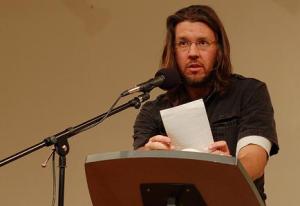You’ve all read blogs, right? In fact, many of you will belong to the first generation that has had access to online blogs throughout virtually your entire reading life: they’ve been around now for well over a decade.
The blog (a contraction or portmanteau term from “web log”) has, over the past decade or more, established itself as a legitimate genre of writing in its right. Blogs are now used for a wide variety of purposes: for academic and scholarly writing, as a form of social or political commentary, as sites devoted to particular “interests” or hobbies, as advertisements and PR, and, of course, as a kind of online diary.
 Because it has established itself as a sort of literary (or, as some would still insist, subliterary) genre, blog writing has developed its own particular stylistic characteristics and features. Some, such as Maud Newton in a recent article in the New York Times, have suggested that the late David Foster Wallace‘s slangy hipply ironic writing style has become the norm for the most popular blogs. (You can tell that blogs are slangy and “hip:” by the fact that I just linked to Wikipedia . . .)
Because it has established itself as a sort of literary (or, as some would still insist, subliterary) genre, blog writing has developed its own particular stylistic characteristics and features. Some, such as Maud Newton in a recent article in the New York Times, have suggested that the late David Foster Wallace‘s slangy hipply ironic writing style has become the norm for the most popular blogs. (You can tell that blogs are slangy and “hip:” by the fact that I just linked to Wikipedia . . .)
While each blog (and often each blog post in collaborative blogs or MABs) will of course reflect something of the personal style of the author, there are common features.
- Blogs are casual and generally colloquial
- Bloggers tend to write as though they were one half of a conversation. The reader, of course, is the other half
- Blog posts are usually quite brief
- On the whole, most blogs work harder at “entertaining” than “informing” the reader
- While some blogs (particularly scholarly ones) will employ conventional citation methods, most blogs simply use hyperlinks to reference sources
- Blogs are often multimedia, employing embedded images and video.
 What much of this suggests is that blogs are no less “literary” than any other form. They are still about catching and keeping the interest of an audience, and, despite their use of a more casual diction and style, they still employ the full range of literary devices to do this. So you shouldn’t be afraid to either.
What much of this suggests is that blogs are no less “literary” than any other form. They are still about catching and keeping the interest of an audience, and, despite their use of a more casual diction and style, they still employ the full range of literary devices to do this. So you shouldn’t be afraid to either.
Blogs are also, to some degree, about the credibility of the author. This is established not only through the use of a sort of “personal voice” in writing, but also by ensuring that the writing is not merely “literary,” but also at least minimally literate. Try to avoid spelling and grammatical errors: these will not endear you to your readers or convince them that you are worth reading.
Choose an audience. Actually, let me choose one for you. Although your TAs and I will be reading your blogs, we are not your main audience. Your fellow students, and you, are. Write for them, and write stuff that they — and you — will find useful for this course. Write about your own impressions of texts, and give your own insights, as well as about the things that you “learned” in tutorial and lecture. Write things that will help you later remember the texts that we read — things that will help recall to mind not merely the “facts,” but also the experience of reading them.
But you have all read blogs. You already know this stuff. Right?



 What much of this suggests is that blogs are no less “literary” than any other form. They are still about catching and keeping the interest of an audience, and, despite their use of a more casual diction and style, they still employ the full range of literary devices to do this. So you shouldn’t be afraid to either.
What much of this suggests is that blogs are no less “literary” than any other form. They are still about catching and keeping the interest of an audience, and, despite their use of a more casual diction and style, they still employ the full range of literary devices to do this. So you shouldn’t be afraid to either.